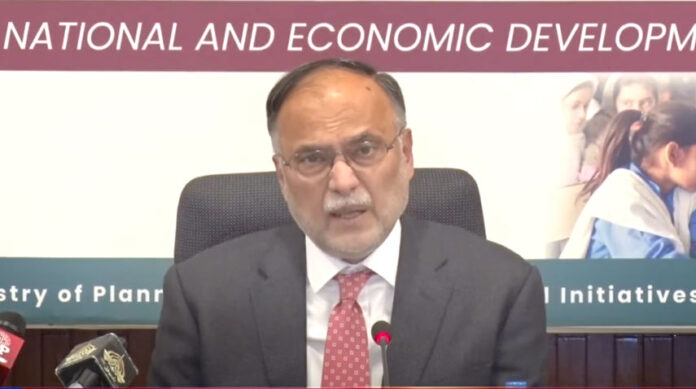ISLAMABAD: Federal Minister for Planning, Development, and Special Initiatives, Professor Ahsan Iqbal, said on Friday that the main focus of the “Uraan Pakistan” program is to promote education, which is essential for the country’s economic growth and prosperity.
Speaking at a media briefing on the Public Sector Development Program (PSDP) and key government initiatives, he said, “Education is a major pillar of the knowledge economy and will play a vital role in the country’s future development.”
The minister shared that Prime Minister Shehbaz Sharif recently launched the five-year National Economic Transformation Plan 2024-29, known as “Uraan Pakistan,” with the aim of reviving Pakistan’s economy. He added, “We are working hard to promote the knowledge economy, and both traditional and technical education have an important role in this.”
Iqbal stressed the need for continuity in policies to ensure long-term economic and educational growth. “Without consistent policies, we cannot achieve economic progress,” he said. He also highlighted the importance of digital innovation, saying, “To advance the knowledge economy and achieve economic development, we must embrace the digital revolution and innovation.”
The minister called for a complete overhaul of Pakistan’s curriculum to make it more relevant to today’s needs. “Our current curriculum does not prepare students for the future. We need to equip them with essential modern skills for the 21st century,” he stated.
He outlined plans for comprehensive curriculum reform and added, “No country can succeed in the long term without a literacy rate of at least 90%. We need to invest in education now for a better future.”
Iqbal raised concerns about the state of education in Pakistan, pointing out that over 25 million children are out of school and the literacy rate is only 61%. “This is a crisis that demands immediate action. These statistics are a major obstacle to our nation’s progress,” he said.
The minister also emphasized the importance of a crash program to improve literacy in collaboration with provincial governments. He praised recent initiatives as steps toward modernizing the education system and preparing students for a rapidly changing world. “These efforts are a leap forward in improving the quality and relevance of education,” he remarked.
Talking about Balochistan’s future, Iqbal said, “In the next 10 years, Balochistan will be the richest province in Pakistan due to its low population and improvements in connectivity.”
The minister concluded by reaffirming the government’s commitment to advancing education and promoting literacy, calling it the foundation for a prosperous Pakistan.




